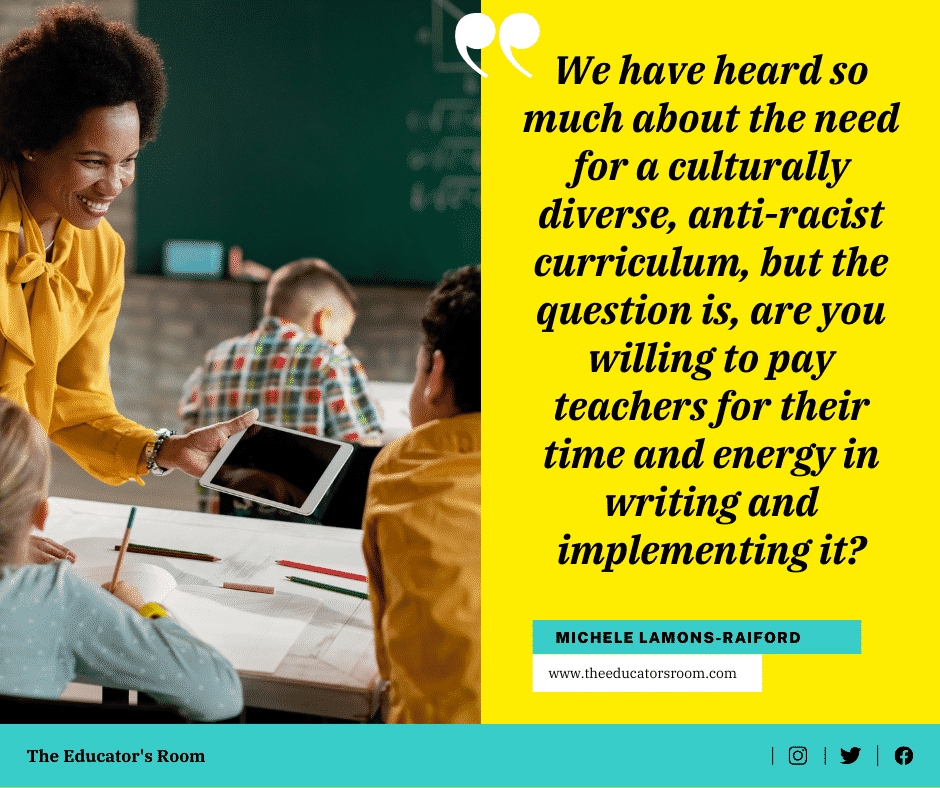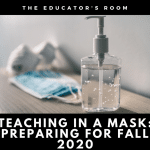We have heard so much about the need for a culturally diverse, anti-racist curriculum, but the question is, are you willing to pay teachers for their time and energy in writing and implementing it? There are many teachers out there who have seen enough seminars and been to enough conferences to have been inspired to begin to take on this challenge of revamping the system from the inside out.
Many teachers are anxious to begin the essential work and even make that “good trouble” with “out of the box”, “out of the cannon” and out of the “traditional” approach to what many argue is a “one-sided” approach to teaching. I, for one, am itching for the time to add so much more to what I consider to be a fairly diverse approach to lesson planning, creating assignments, and having a more student-centered approach to education.
Transparently, I was stuck in what I now call the “typical” four areas of what I thought could be considered a diverse curriculum: White, Black, Asian, and Latinx/Hispanic. I unconsciously limited the diversity of my lessons by what I considered to be “diverse”, as long as it was outside what is considered to be a Eurocentric view. But that was and is far from enough. To explore each continent, each country, each culture, should not be limited to just an Ethnic Studies class students have to wait until college to be exposed to. We need to purposely diversify our curriculum in ALL disciplines. But even with the proper experience, training, and a culturally diverse “mindset”, what teachers need is TIME.
I put forth the following solutions to those at the “top” advocating for teachers to put into practice what many of us have learned about culturally relevant pedagogy.
Pay us for our time. Provide time (and subs if needed) for teachers to develop lessons plans and units that include purposely diverse, culturally relevant, anti-racist, current, relatable material, and student-centered. In the words of Joe Truss, “We fight for equity because it’s so important.” Many already have (or have recently adopted) an “equity” mindset.
Teachers are ready to actually use all of their training. If the powers that be are worried about accountability, make sure that everyone knows that in order to be paid, the lesson plans and units must be turned in before payment is issued. Further accountability could be an additional stipend for teachers to provide a reflection on how the lesson went, or better yet, student feedback on the lesson or unit. Personal and student reflections would also help teachers to adapt, revamp or completely change lessons to provide the most effective outcomes. This entire experience of being provided the time and compensation would potentially encourage teachers to put the things they have learned about culturally relevant, purposely diverse, pedagogy into practice more often.
True collaboration should be encouraged. Collaboration is more than just sitting in monthly faculty meetings, or discussing how to improve data, or emailing about common students. In the words of Bettina L. Love, “Theory does not solve issues—only action and solidarity can do that…” Cross-curricula lesson plans and assignments are ones that many teachers wish they had time to create. A one or two-day session with another teacher is all it would take to develop a culturally diverse AND cross-curricula lesson plan. My mind is racing with ideas as I type, imagining a successful collaboration with so many different teachers, in so many different disciplines, on so many different subjects, guaranteed to be relevant, engaging, and culturally affirming.
Teaching is one of the few professions that require a continual renewal of credentials and ongoing professional development. We are lifelong learners and are ones who oftentimes, continually hone our craft. In her book, Cultivating Genius: An Equity Framework for Culturally and Historically Responsive Literacy, Goldy Muhammad stated the following, “We live in a period where there’s no time for ‘urgent-free pedagogy’. Our instructional pursuits must be honest, bold, raw, unapologetic, and responsive to the social times.”
There is no loss for material to work with, especially with America providing us with …(issues/events?) that we can use to create engaging lessons plans on the daily. Of course, there are some who will implement purposeful diversity because it is a part of who we are, but we could do so much more if we had the time. We are here, we are ready, and we are willing.
Maya Angelou stated the obvious quite simply,” If you don’t like something, change it.” In this case, change begins by reaching into that newly stuffed “pandemic purse” of seemingly endless funds and pay teachers to develop what you have been asking for decades to see.






